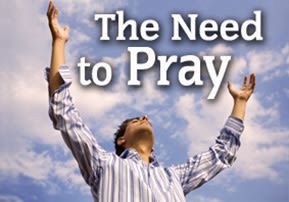
The Need to Pray
“I’m not big on meditation and all that stuff. But the prayers that I pray - they’re my own concoction - makes me feel at peace with creation…”

“I can’t tell you why because I don’t consider myself to be a religious person. But I do like to start my meals by thanking, well, thanking whatever it is that’s out there for what I’m about to eat. It just seems like the natural thing to do.”
* * *
ANY DISCUSSION ABOUT PRAYER is going to have a philosophical beginning. Even if one takes a very “scientific” approach to mankind’s desire to pray, one will still be confronted by the question, why does he have this desire, this need to pray. (The Talmud (Bava Kamma 2a) refers to man as mav’eh, a name seldom used and derived from the root beis ayin heh, which means to pray, as if to say, man is a creature who prays.)
Why mankind prays has a lot to do with what he is, and why he is that way. Whenever a certain characteristic is common to masses of people, regardless of location and climate, one has to assume that the characteristic is an inherent part of man, such as eating for example. (Habitat will determine what we eat, and upbringing and tradition will determine how we eat, but neither determine why we eat. It turns out that we eat because we require food to survive, and we need to survive because that is part of who we are – it is instinctual to survive.)
If the need to pray is one of those characteristics, then even though it takes a “foxhole” to make an atheist pray, the fact that he doesn’t pray “outside” of his foxhole doesn’t mean he has no need to. For, just as a person can accustom himself to not eating, to the point that the body rejects food, so too can one accustom himself to not praying, to the point that one rejects prayer.
However, we call the condition when one is unable to eat a physical disease. Likewise, when people stifle their innate need to pray, the result is also a lack of wellness, in the spiritual and psychological sense.
Somehow when I pray I’m connecting to something. That makes me feel good. It makes me feel tranquil. I’m not big on meditation and all that stuff. But the prayers that I pray – they’re my own concoction – makes me feel at peace with creation.
So what is it then that drives people to pray?
Though not everyone today believes that the Bible is the word of God, almost everyone in the Western world is familiar with its description of the creation of man.
God formed man out of dust of the ground, and breathed into his nostrils a breath of life. Man thus became a living creature. (Genesis 2:7)
Many things were created during the six days of creation, but only the origin of man is detailed. And from the Torah’s account of the creation of man, it would seem that Mother Earth is indeed Mother Earth, having given “birth” to all of mankind.
However, it is important to note that not only man was molded from the earth. According to the account, God first created the heavens and the earth, and then proceeded to extract from the earth the plants, animals, etc., all the way up to Adam himself. (Midrash Tanchuma, Genesis 1)
Thus from the Torah’s point of view, all elements of creation are separate “loaves of bread” created from a single dough. Mankind is separate from animal-kind, as are the two different from the vegetable world. But in essence, there is a common element that unites all of us together.
This, from the Jewish perspective is not incidental, but an important aspect of mankind’s ability to achieve fulfillment in the ultimate sense. Nothing ever breaks away completely from its source of existence, and therefore mankind remains a part of the physical world from which he was taken, no matter what he does to free himself of it.
For this reason, it seems that mankind’s harmony, which he lives for, is dependent upon the harmony of all of creation. And for this reason, prayer plays a major role in bridging the gap between man and the world around him, as his creation further reveals.
God… breathed into his nostrils a breath of life. Man thus became a living creature. (Genesis 2:7)
A living creature… able to speak – Onkelos
(Onkelos is one of the foremost interpreters of the Five Books of Moses, and he explained that what God breathed into man resulted in the power of speech.)
What is the role of communication? Is it to merely convey information? This, perhaps, is what communication has become as a result of the fast-paced lifestyle of modern-day society. But, according to the above verse, there must be a more significant reason for our Godly ability to talk.
From the Torah’s point of view, talk is never cheap. It is the result of the union of body and soul, the product of the fusion of two unique and virtually opposite entities. However, its most powerful application is what it allows strangers to be able to achieve.
When I talk with myself, I feel a greater sense of who I am… of my being. When I talk with others, I connect with them. And when I talk to God, all of a sudden I feel different. Maybe it’s my imagination, but I believe that what I am feeling is really a greater sense of His being.
Animals also communicate among themselves. They have a way of conveying information – warnings, mating calls, etc. But it is difficult to imagine that their communications serve to emotionally and intellectually draw them closer together.
Communication among humans is different, or at least it should be. Computers transfer information; human beings convey essences of ideas. The role of communication is to share worlds, to create an image in the minds of others of the world we see and experience. The role of speech is to find a common ground.
By sharing words, we bring one another into each other’s world, and this serves to unite us, to help us come to common conclusions, and ultimately, to harmonize with one another.
If prayer is a form of communication, and it is, then somehow it must serve to unite us with that to which we need to be connected, after which we are able to achieve complete harmony and sense of being, something we need to do.
Summary:
The inherent drive within many people to pray to a supernatural being is based upon a need that every human being has, a need to achieve harmony with all of creation. This need stems from the very nature of man’s being, and prayer, somehow, bridges the gap between man and creation resulting in the harmony every individual seeks.
***
Pinchas Winston is the author of over 95 books on various topics that deal with current issues from a traditional Jewish perspective. He has also written on the weekly Torah reading since 1993, called “Perceptions”, as well as on current topics and trends affecting Jewish history, past and present. One of his missions is to make the depth and beauty of the more mystical teachings of Torah understandable and accessible to those who can really benefit from them. Visit his website at thirtysix.org.













Tell us what you think!
Thank you for your comment!
It will be published after approval by the Editor.